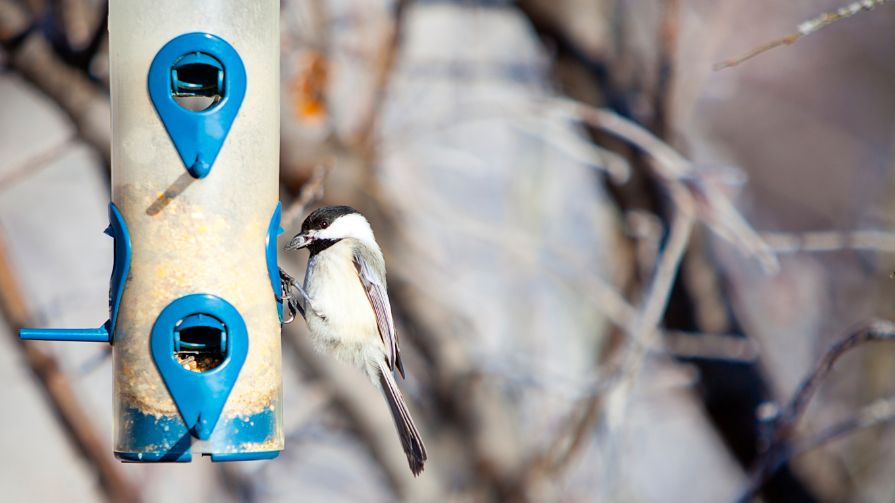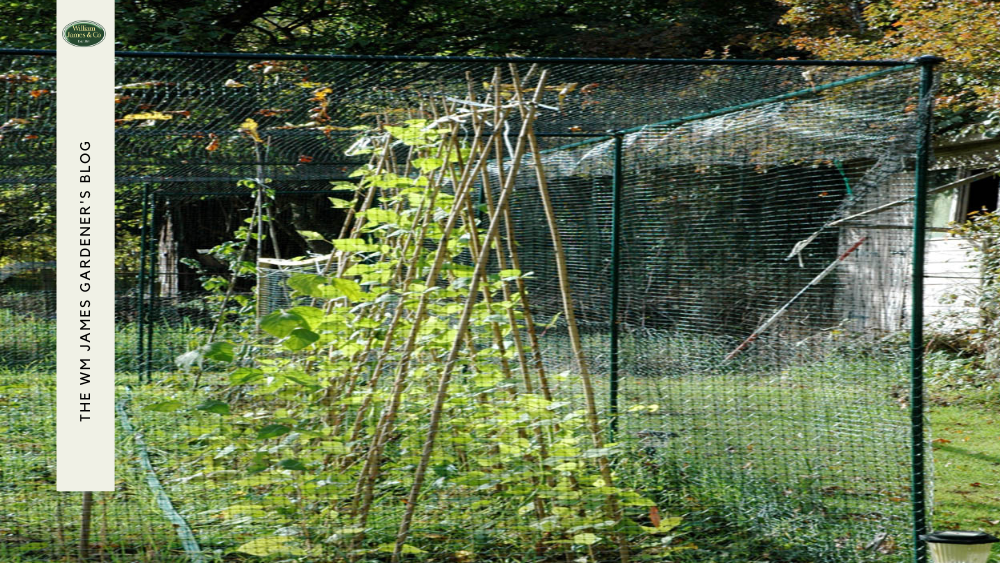We use cookies to make your experience better. To comply with the new e-Privacy directive, we need to ask for your consent to set the cookies. Learn more.
10 Tips On How To Stop Foxes In Your Garden
- Admin
- WM James Gardening Blog
- 18 Jan 2023
-
2087views

We've all had the frustrating experience of discovering that a fox has been in our garden, raiding our compost bin and digging up plants. It can be frustrating and a little disheartening.
Foxes are naturally curious scavengers who are attracted to any potential food sources. Any garden that looks inviting, rural or urban, they’ll take advantage of snacks and shelter.
Thankfully, there are several steps you can take, as well as equipment you can use, like switching to a secure compost bin or covering your plants with high-quality netting to keep the foxes at bay.
Here are some of our recommended products, which you can order online today with free UK delivery*!
Read more about different ways to keep foxes out of your garden.
1. Remove Any Potential Food Sources From Your Garden
One of the most common reasons why foxes visit a garden is because there is food available.
Remove any potential food sources – including compost, pet food, fruit and vegetable scraps – from your garden to discourage foxes from visiting.
If you have any pets, make sure to feed them indoors and block off any areas where they can leave food scraps outside.
If you’re an avid compost heap grower, secure your stash today with our sturdy wooden Beehive Composter.
2. Secure Your Bins
Foxes are notorious bin raiders, so make sure your bins are secured with a sturdy lid. It's also worth investing in a lockable bin or a fox-proof container if you're particularly concerned about foxes getting into your rubbish.
A bin storage unit can also be a useful deterrent, as it will make it harder for foxes to access your bins. Choose a sturdy unit with a latch that can be securely closed.
This will help to deter foxes, and even signs of a rat infestation, as they won't be able to access the contents easily, and eventually, they will be put off from visiting your garden.
3. Place Your Bird Feeders Out of Reach
Foxes can be opportunistic feeders, so make sure your bird feeders are placed in an area where foxes cannot reach them.
It's best to hang bird feeders at least 5 feet off the ground and away from shrubs or trees that may provide access for foxes.
If you have a tall fence, you can attach your bird feeder to the inside of this to keep it out of reach.
4. Ensure There Are No Access Points in Your Garden
Foxes are excellent climbers and can squeeze through surprisingly small gaps, so make sure to check your garden for any potential access points.
Look out for cracks in walls or fences and block them up with mesh netting or other materials.
If you have a shed, make sure the door is securely closed at all times.
If you know that foxes have been accessing your garden, it might be a good idea to monitor them for a few days and see where they are getting in. This will help you identify which areas need to be sealed off.
5. Regularly Check For Tell-Tale Fox Signs
On the other hand, if you are not sure if foxes have been in your garden and you're just being cautious, it's a good idea to regularly check for signs of them.
Look out for paw prints and droppings that indicate where the fox has been. You might also spot holes or other digging marks that indicate they've been looking for food.
You can also look for tracks leading away from the garden to see if they are using your garden as a travel route.
6. Cover Your Pond
If you have a pond in your garden, make sure it's covered with pond netting or another material that foxes cannot easily access. This will help to protect any fish or amphibians from being targeted by foxes.
Make sure you choose a netting with a mesh size that is small enough to prevent foxes from reaching through yet still allowing other wildlife to access the water.
7. Use Fruit Cages to Protect Your Plants
There's nothing worse than having your prized plants destroyed by foxes. To protect them, use a fruit cage to provide a good level of security.
Fruit cages can also be used to protect vegetables, fruit trees and berry bushes, as well as flowers. They can be great deterrents, as foxes are very unlikely to be able to gain access if the fruit cage door is secured properly.
Not only will this help to deter foxes, but it will also protect your plants from other potential predators, such as cats and birds.
8. Use Safe Deterrents
You can also try to deter foxes from your garden by using safe deterrents.
Motion-activated water sprayers, sonic devices and odour repellents are all effective methods of keeping foxes away. Be sure to use products that are approved for use in gardens, as some of the more unpleasant repellents can be harmful to animals.
You can also create your own scarecrow or sound-emitting device to scare away foxes. Just make sure it's well-maintained and still effective after a few weeks.
Foxes are particularly sensitive to strong scents, such as:
- Citrus fruits
- Garlic
- Chilli powder
- Coffee grounds
By using these and other safe, natural deterrents, you can discourage foxes from entering your garden.
9. Produce Noise if You Spot a Fox
If you spot a fox in your garden, don't hesitate to produce noise. Making loud noises, such as clapping or shouting, could help to scare away any foxes that are nearby.
It might seem obvious to do this, but it's important to remember that foxes can get used to people very quickly, so make sure to follow up on this with other measures.
If you have a dog, allowing them outside for short periods of time when you spot a fox might also help to deter future visits from the animal.
10. Contact Your Local Wildlife Rescue Centre
If you feel like you have tried every measure under the sun to keep foxes away from your garden and nothing is working, it might be time to contact a local wildlife rescue centre.
These organisations can help you to find a humane solution to the problem.
Make sure to check out your local Wildlife Trust's website for more information on how they can assist you with managing foxes in your garden.
What Do You Do if You Find an Injured Fox in Your Garden?
If you find an injured fox in your garden, you should contact a local wildlife rescue centre for advice and assistance.
Do not attempt to handle the fox yourself, as it can be dangerous. The experts at the centre will have the right equipment and experience to deal with an injured animal humanely.
You should also take steps to ensure that the fox is not disturbed by any other animals or people while it is being cared for. If possible, keep pets away from the area and advise neighbours not to approach the animal either.
Summary: How to Keep Foxes Out of Your Garden Safely
Nobody likes having foxes in their garden. These animals can cause a lot of damage and disruption for homeowners, not to mention the danger they pose to small pets and children.
Fortunately, you can take some steps towards fox-proofing your garden to make sure they stay away. Fences and fruit cages can provide a good level of security, while safe deterrents like motion-activated water sprayers and odour repellents can be effective in keeping foxes away.
Hide food sources foxes may be attracted to, and make sure to produce noise if you spot a fox in your garden.
It's important not to take any measures that will be harmful to the fox or put them in way of danger. Instead, you should contact your local rescue centre for advice and assistance if you are struggling to keep foxes away from your garden.
For humane ways of deterring foxes, shop our recommendations below and see what a difference they make to your outdoor space!
| Premium Aluminium Walk-In Fruit Cage Frame & Netting | Classic Steel Low Vegetable Cage | Heavy Duty Plastic Netting 50mm |
| Double Wooden Bin Store | Beehive Composter | Heavy-Duty Pond Cover Netting 50mm |
*Get free UK delivery on orders over £100.
FAQs
What will keep a fox away?
The best way to keep foxes away from your garden is to proof your garden and remove any potential food sources. Fill in any access holes or burrows to make it difficult for foxes to access your garden.
If the problem persists, you may need to contact a wildlife rescue organisation or pest control specialist for further advice.
How do you get rid of foxes naturally?
You can get rid of foxes naturally by using deterrents or sprays that contain natural ingredients such as peppermint oil. You can also produce loud noises when you spot a fox in your garden, or contact a local wildlife rescue organisation for further advice.
What smell keeps foxes away?
Foxes have an extremely strong sense of smell and are particularly sensitive to scents like peppermint oil, garlic and chilli powder. These smells can act as effective deterrents and will keep foxes away from your garden.
How do I get rid of foxes fast?
If foxes have been coming into your garden or property, the best way to get rid of them quickly is to block off any of their usual access points and remove any potential food sources.


















